Last updated: December 10, 2024
Article
The People Behind Northern Nights, Starry Skies
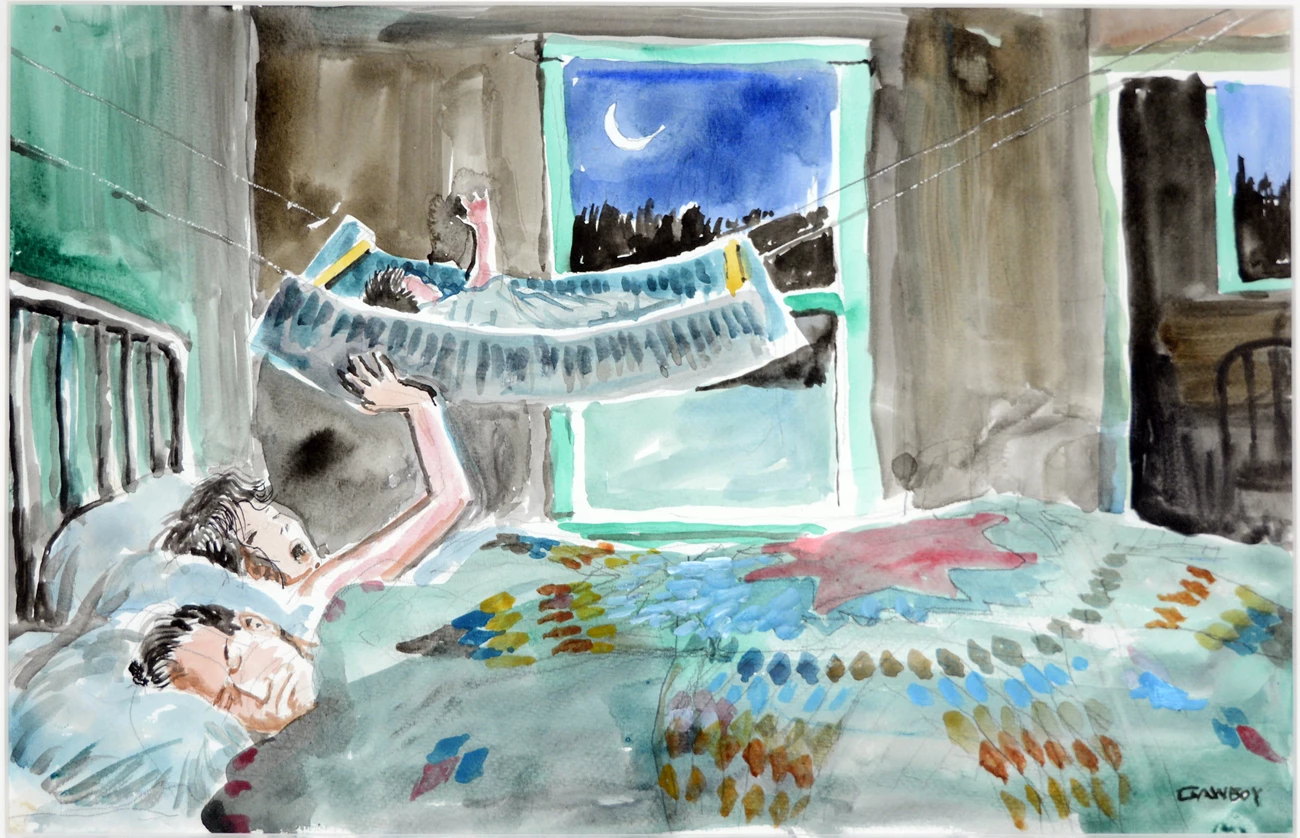
Is the young father just pretending to sleep through this?
Watercolor courtesy of Carl Gawboy
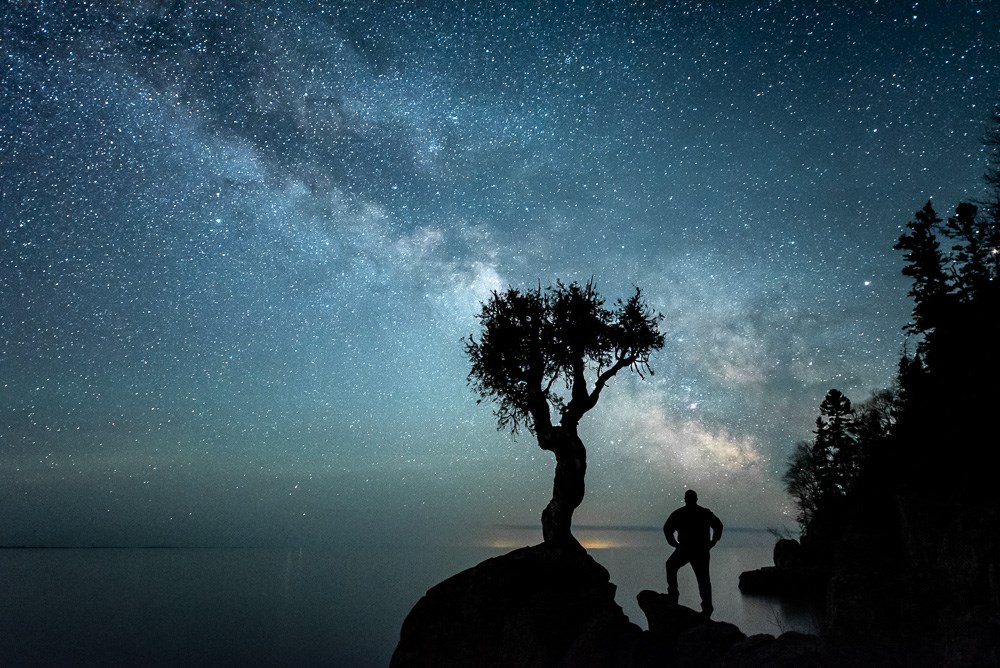
Exposure Time: 20 seconds. Aperture: f/2.8. ISO: 10,000
Photo courtesy of Travis Novitsky
This exhibit is in conjunction with Northern Nights, Starry Skies, a co-production between WDSE and Hamline University’s Center for Global Environmental Education, celebrating stars and dark sky places, Indigenous star knowledge, and stewardship of the night sky. Works of Carl Gawboy and Travis Novitsky are on display upstairs at the Heritage Center beginning December 10, 2022 through January 31, 2023.
The Grand Portage Anishinaabe (Ojibwe), a people with a distinct culture and proud heritage, have lived for centuries on or near Grand Portage where their culture thrives today. Located on Lake Superior on Minnesota's North Shore, Grand Portage's place away from urban ambient light allows us to see the same night sky for thousands of years.

Photo courtesy of Carl Gawboy
Making Connections with the Night Sky
Carl Gawboy, a member of the Bois Forte Band of the Minnesota Ojibwe, is an accomplished artist and retired professor of American Indian studies at the College of St. Scholastica. Carl has a lifelong interest in exploring the connections between ancient pictographs and traditional Native American understandings of astronomy and the constellations. Through this exploration, he became the first in modern history to make a connection between some of the area's rock paintings and Ojibwe constellations.
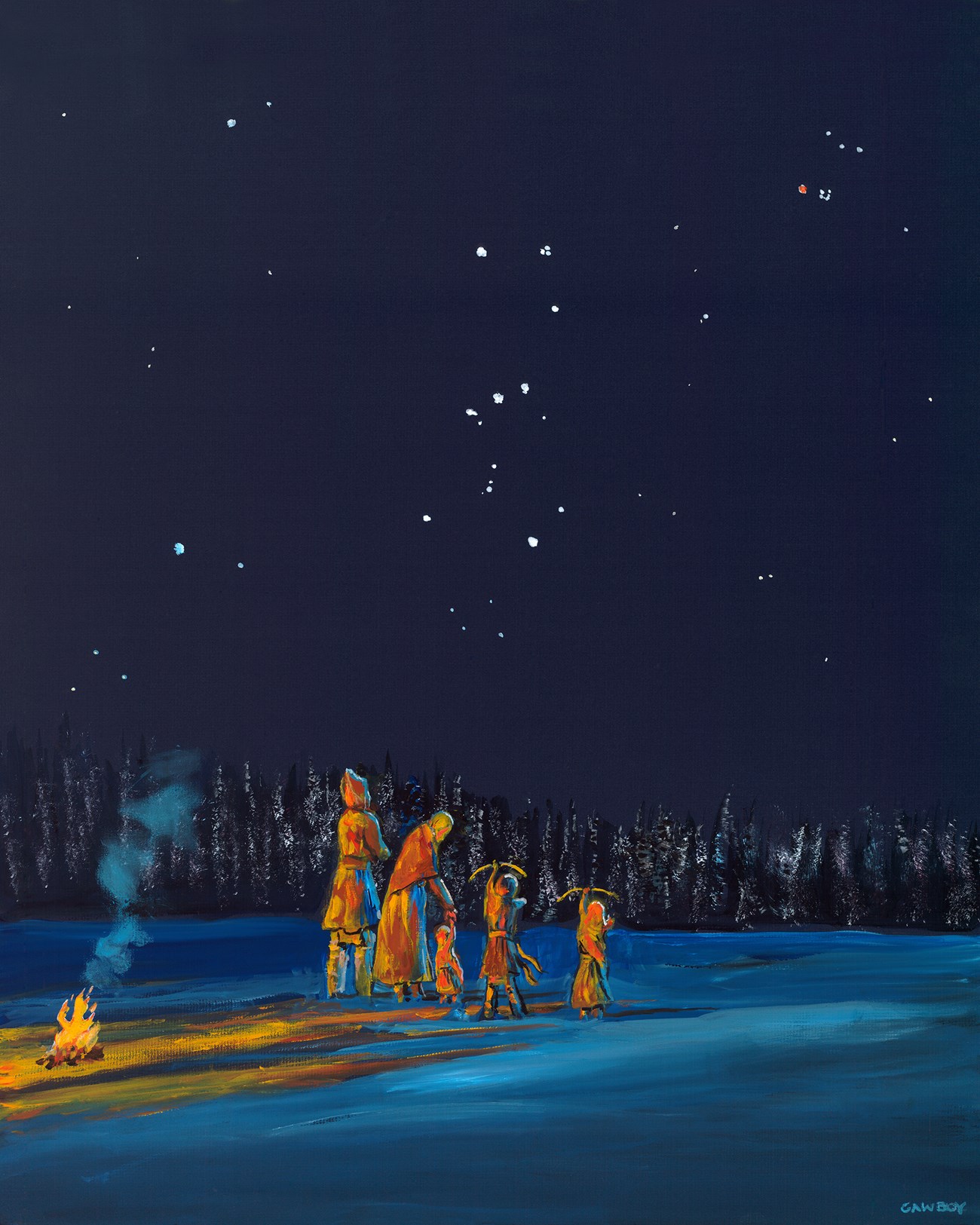
Painting courtesy of Carl Gawboy
Biboonikeonini (the Wintermaker)
It's long ago and the children are cold. Winter has gone on too long. They make toy bows and arrows for the children. "Shoot the Wintermaker" they tell them. They do. And sure enough, it warms up.
from Tales my Grandmother Told Me by Maude Kegg (from Mille Lacs)
Biboonikeonini is approximately the same as Orion with a few additional stars and is visible about six months, the length of winter in the north country. When the Wintermaker rises in the sky and gains strength, it is time to move deeper into the forest, away from cold winds, into small groups. This is the season of family, storytelling, and crafts, the time to prepare for the other three seasons. As Biboonikeonini tilts toward the west, the winds have a breath of warmth, and the snow begins to melt, it is time to shoot him out of the sky to make way for ziigwan (spring).
Carl Gawboy, Talking Sky
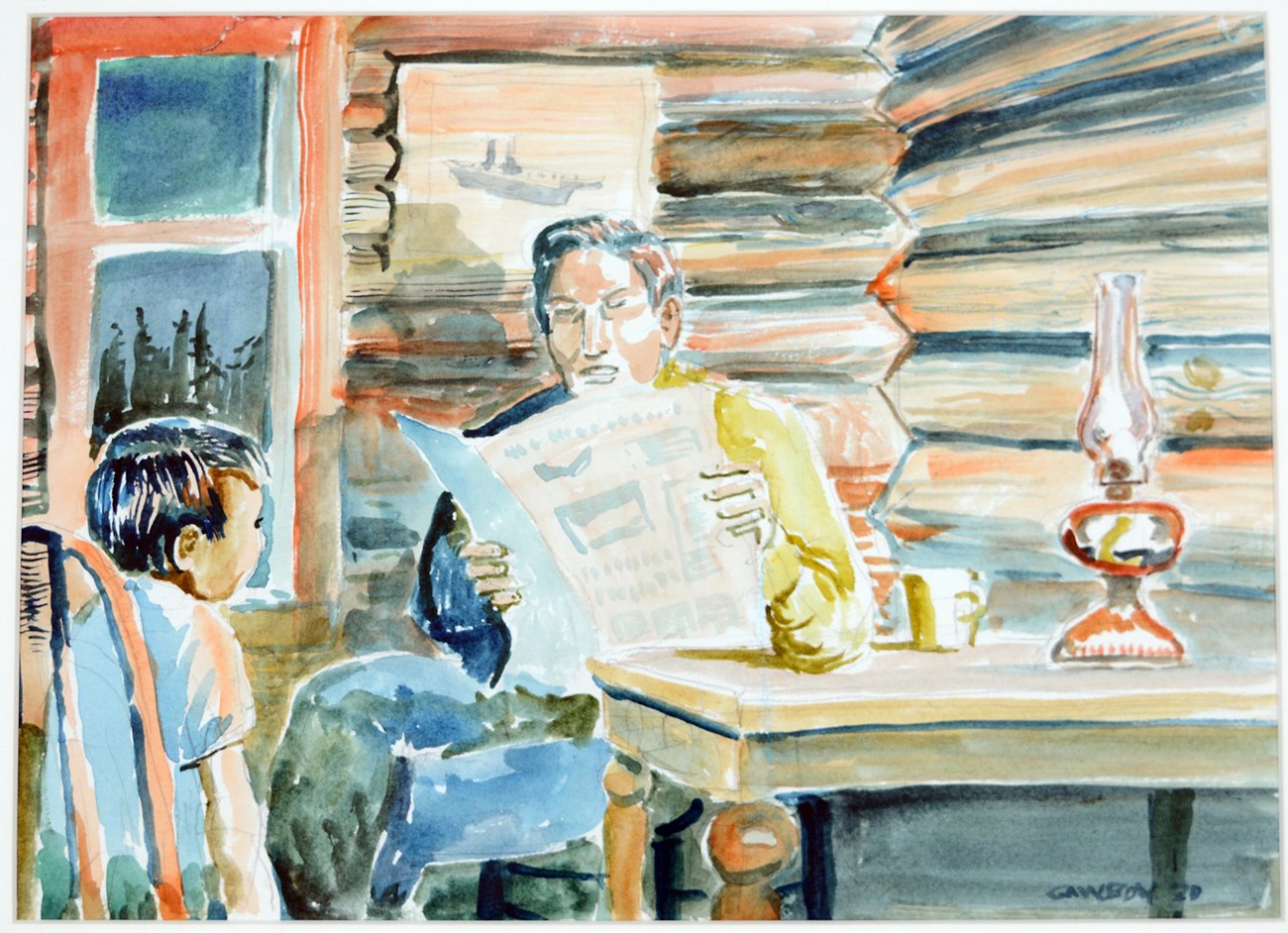
11.5" x 18"
Watercolor courtesy of Carl Gawboy
Stars and Stripes
I can’t remember if my cousin was on leave or had been discharged; but I remember him reading “Stars and Stripes” (The Military Man’s newspaper) by kerosene lamp.
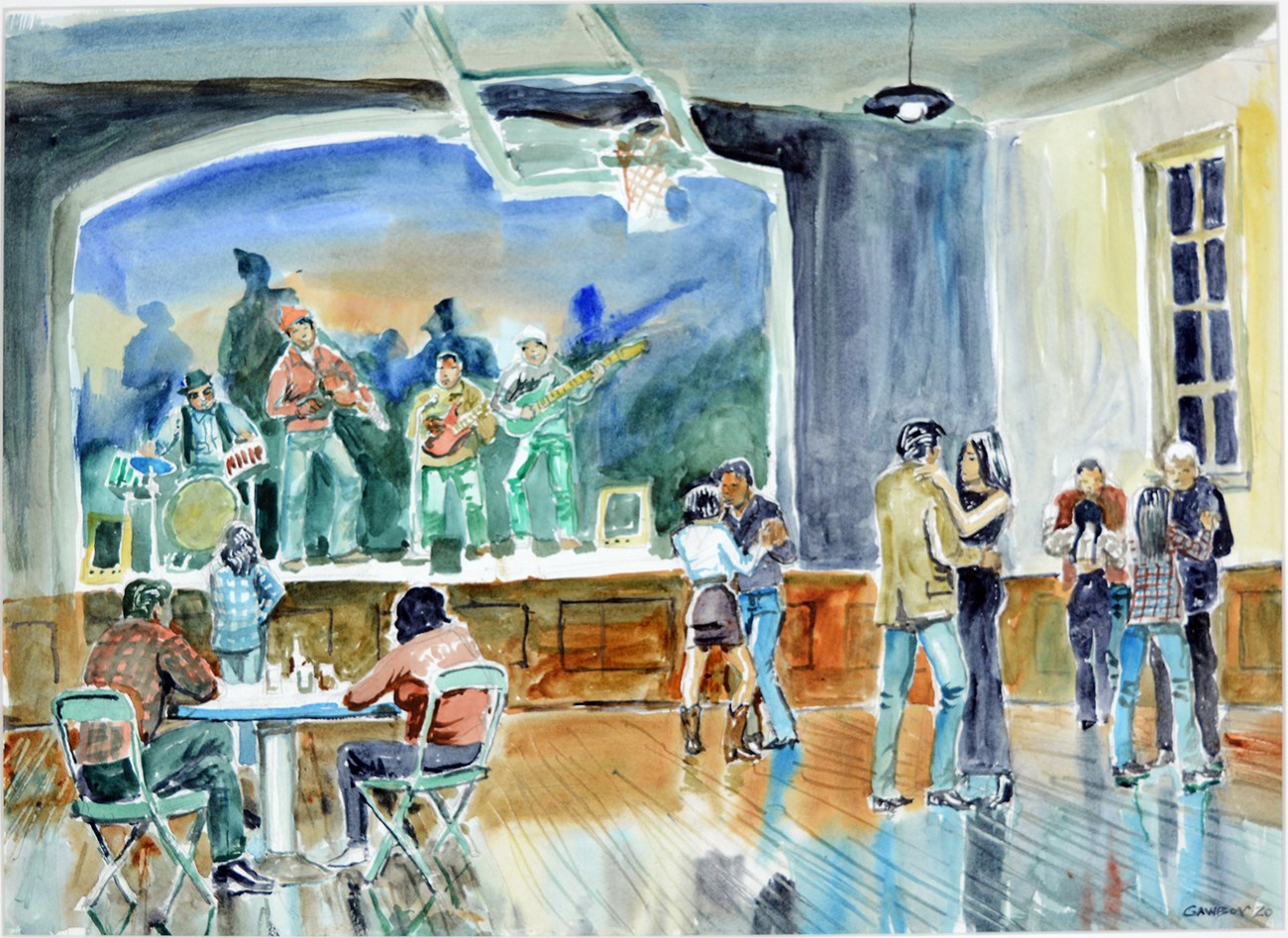
18" x 24"
Watercolor courtesy of Carl Gawboy
Cree Fiddlers
I saw this band in Saskatoon, Saskatchewan.
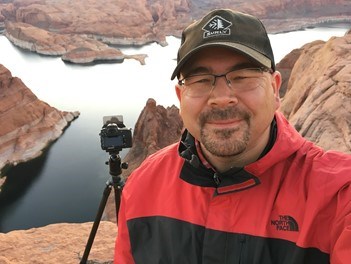
Photo courtesy of Travis Novitsky
Stewarding the Night Sky
A life-long resident of the north shore of Lake Superior, Travis Novitsky was born in Grand Marais, Minnesota, and resides in Grand Portage. He is proud to be a citizen of the Grand Portage Anishinaabe Nation.
Travis specializes in images of nature and wildlife, but his favorite subject is the night sky. He devotes countless hours to capturing images of moonlight, the Milky Way, and the Aurora Borealis. Sharing these images reminds us of the importance of preserving our dark sky places.
That's why I like the night sky so much. It's the easiest way I can quiet my mind and just be there in the present. When I'm gazing up at the sky, especially on such a quiet night, I feel utterly and completely relaxed and refreshed.
The following are selections from Travis Novitsky's stories with each photo in the exhibit.
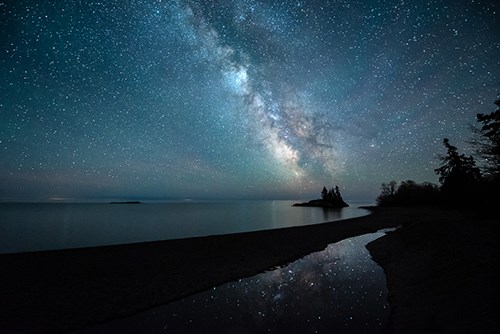
Exposure Time: 30 seconds. Aperture: f/2.8. ISO: 6400
Photo courtesy of Travis Novitsky
The River in the Sky
The overall process of going out and spending time under the night sky and capturing these cool photographs of the Milky Way or the Northern Lights doesn’t happen by accident. It is very intentional. There is a lot of thought and planning that goes into it. You need to be prepared in order to get the best results.
I will scout out locations well ahead of time before I go and photograph them at night. I am always mindful of which direction I’m facing. Views to the south are best for the Milky Way, to the north are best for the Aurora Borealis.
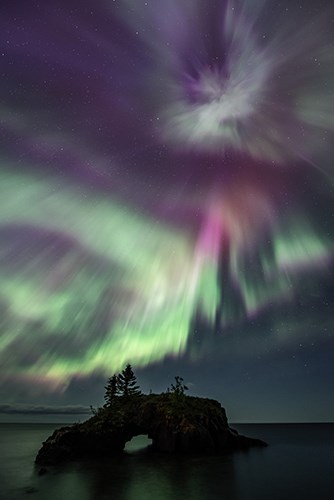
Exposure Time: 10 seconds. Aperture: f/2.8. ISO: 1000
Photo courtesy of Travis Novitsky
Solar Storm Explosion
2015 was an AWESOME year for northern lights! They occurred frequently and were strong, sometimes filling two-thirds or more of the sky. June 23rd of that year was the absolute best of the best aurora shows that I’ve seen. I had planned on heading inland from Lake Superior that night to photograph the show over an inland lake, but I never made it there.
My plan was to drive a few miles south to Hovland, Minnesota, then drive inland along the Arrowhead Trail. However, as I was driving down Highway 61, I saw the lights erupting over Lake Superior, which is to the south! I pulled into Hollow Rock Resort along the Lake Superior shoreline, just a few miles south of the village of Grand Portage. When I got out of my car and looked at the sky, I couldn’t believe how active the lights were to the south, and how little activity there was in the northern sky! The exact opposite of what we typically see in northern Minnesota.
...It was a night of frantic activity with the camera. ...A few times there were some brief explosions of color where bright reds and purples could be seen.
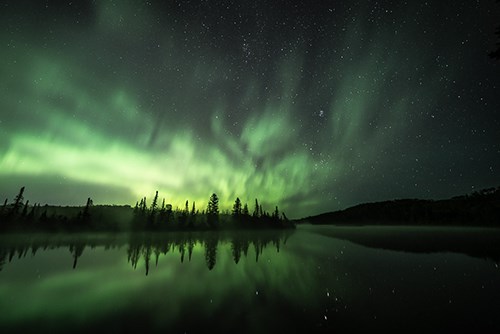
Exposure Time: 15 seconds. Aperture: f/2.8. ISO: 1600
Photo courtesy of Travis Novitsky
Border Country Aurora
It had been a long time coming but, in the early morning hours of September 4, 2022, we finally got a northern lights display to rival those that we saw during the last solar maximum several years ago!
As often happens, the activity ebbed and flowed which kept things interesting. Several times, just as the lights were slowing down and fading and I was thinking I had seen the night’s best activity, they would once again flare up and provide another round of waving and dancing throughout the sky.

Exposure Time: 30 seconds. Aperture: f/2.8. ISO: 6400
Photo courtesy of Travis Novitsky
Summer Solstice Night Sky
I spend a lot of time in the daylight hours scouting for possible locations to photograph at night. Whether it's hiking or just driving around in the state or national forests on some gravel roads, or out canoeing or biking, or even skiing or snowshoeing, I am always on the lookout for potential locations for photographing the night sky. Locations that I am either already familiar with or that I haven’t discovered yet, and just kind of having an eye for where the Milky Way might line up when I’m in that place at night.
Look closely to see Ojiig'anuung (fisher star constellation), otherwise know as Ursa Major or the Big Dipper, plus a few extra stars.
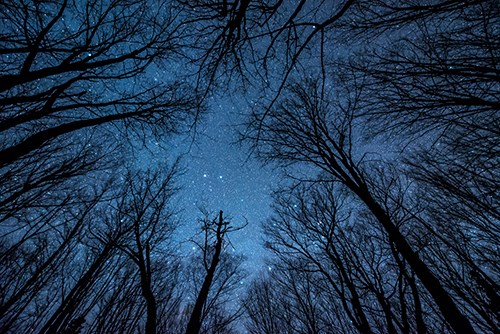
Exposure Time: 30 seconds. Aperture: f/2.8. ISO: 6400
Photo courtesy of Travis Novitsky
Quiet Night in the Maple Forest
One of my favorite things to do is to snowshoe through the woods at night, whether it’s under the soft glow of the stars or the bright light of a full moon. Hearing the trees pop as they give way to the bitter cold temperatures and the soft swooshing sounds of your snowshoes as they glide through the snow crystals.
The peacefulness of being out in the forest on these nights is incomparable. It keeps me balanced and reinforces that feeling of being connected to everything around me. Just being under this glowing sky is something that nothing else compares to. I think its important for us to keep that connection to the stars as much as we can. Because it is, ultimately, where we all came from.

Exposure Time: 30 seconds. Aperture: f/2.8. ISO: 6400
Photo courtesy of Travis Novitsky
The Connection of Earth & Sky
Water connects the earth and the sky. This is often most evident when you are at an inland lake, and you see the stars and the Milky Way reflecting on the surface of that lake. You are gazing up at that big, beautiful line that is this arc through the sky, that milky band of stars and light, which is just larger than life it seems. On those nights when there is absolutely no wind, you can see this almost perfect reflection, this mirrored image, of the sky.
If you are out on the lake in a canoe or a boat, the sky is both above and below you. It can feel like you are floating out there in the universe...
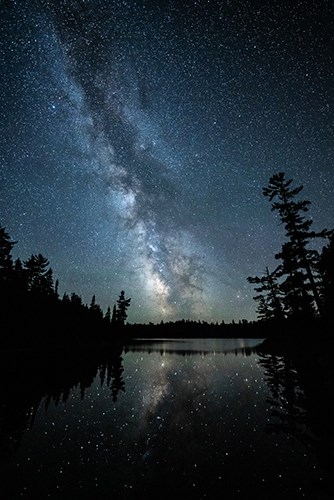
Exposure Time: 30 seconds. Aperture: f/2.8. ISO: 6400
Photo courtesy of Travis Novitsky
The Magnificence of the Milky Way
When I arrived at the lake there were a couple of rabbits that were running around in the brush near the shoreline. As I took in the scene and planned out my composition, I could hear them chasing each other back forth in the woods. After a while they either got tired or left the area as there was no longer any sound. By then I was making my first exposures and getting my composition dialed in.
By the time I had everything just right, I could again hear rustling in the woods behind me. Only this time it sounded different. This time it sounded like a much larger animal. I turned and faced the shoreline, but it was much too dark to see anything. The noises kept coming closer. I could hear a couple of twigs snap, then I could hear the animal breathing. I turned on the soft red light of my headlamp and there was a moose standing there near the edge of the lake, about 30 feet away!
...the moose turned and started to walk through the brush along the water’s edge. It walked right past the end of the dock and through the brush for about another 50 feet along the lakeshore then turned and headed back inland. ...I never saw or heard it again that night.
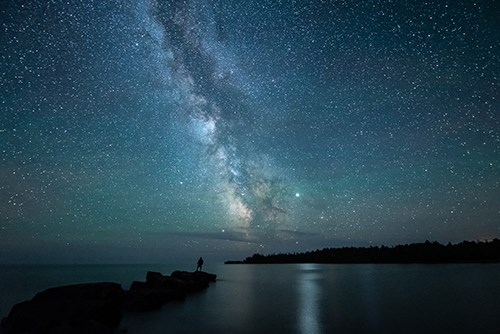
Exposure Time: 30 seconds. Aperture: f/2.8. ISO: 6400
Photo courtesy of Travis Novitsky
The Truth is Out There
I try to practice mindfulness and being in the moment as much as I can and it's had a profound effect on my life. I used to busy myself with capturing as many images as possible and thinking about when or how I was going to share them with the world. But lately I've been doing less of that and instead trying to fully immerse myself in each moment and experience. Much of the time when doing this I never even take my camera out of the bag.
... I feel that this photograph ... conveys the sense of calm and peacefulness that comes with truly being in that moment, right then and there.
